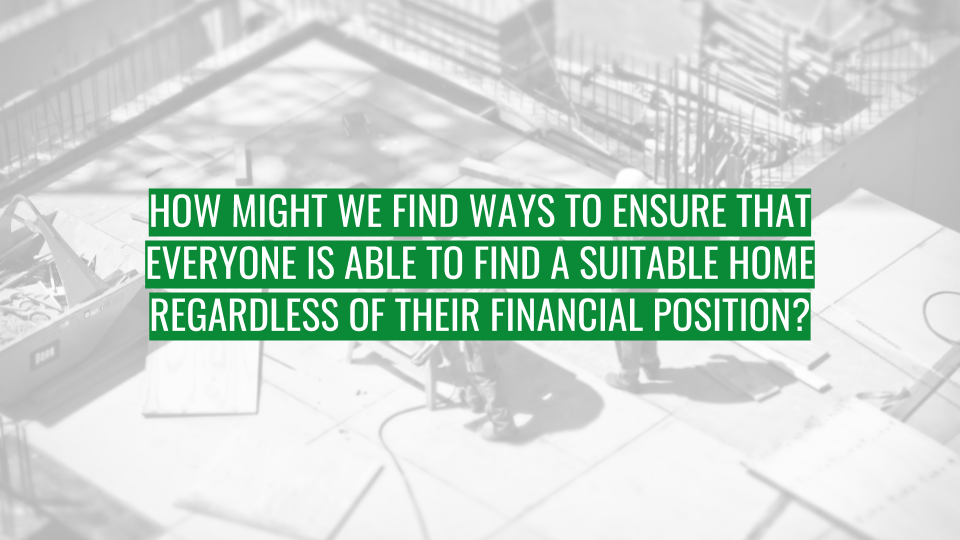Introduction
This was the eighth of our discovery sessions around the 10 ‘how might we’ questions that make up our current exploration pipeline.
Working out loud is one of our Lab guiding principles and we are really keen to share both our colleagues work and their ideas. We are sharing the high-level themes which emerge from each session, rather than waiting for them to be worked up into something more substantial. Following the sessions, the next steps will be for Innovation and Insight to work up some solid test plans based on what we learned and we will, of course, be sharing more about those in due course.
Workshop Summary
The output from previous service design and discovery work formed the starting point for this last discovery workshop on the theme of Finding a Home and Property Planning.
Key questions we wanted to explore included:
- What if we designed our homes differently – For example; what does a home look like that is completely flexible, adaptable, can get bigger, get smaller, offers higher density, BUT remains properly prefabricated?
- Is it possible, or advisable, to cater for all customer profiles?
- How can we become more in control of our destiny matching product types to customers?
- What role does community play in property planning?
Early work had determined with colleagues that finding a home should be a whole life service where mobility is encouraged as circumstances or aspirations change. This is currently a complex service area that we want to simplify over time. This means challenging ourselves when designing services - we don’t want to recreate today’s complexity in our future offerings.
Importantly - we wanted to challenge the way we currently think about strategic property planning including what we mean when we talk about homes and communities.
In order to get the conversation started we showed colleagues a short film of Walt Disney introducing his Experimental Prototype Community of Tomorrow (E.P.C.O.T). During the 3 minute clip, Walt Disney spoke about:
- Starting with public need
- Starting from scratch
- Community is at the heart of everything
- Communities are always evolving
- Dedicating everything to the happiness of the people who live work and play in the community
- Providing a place that people can’t find anywhere else in the world
- Pushing industry to develop technologies that don't exist today
- Developing new solutions which meet the needs of people living in the community
Clip: Walt Disney introduces his vision for the Experimental Prototype Community of Tomorrow (E.P.C.O.T) 10min 20sec to 13min 20sec
We also provided a set of ‘design fictions’ to spark imagination. Design Fiction is a design practice which aims to explore possible futures by creating speculative, and often provocative, scenarios narrated through designed artifacts, which in this case were a set of posters.
The point of providing both the video and the posters wasn’t necessarily to identify how to move towards these particular examples, but rather use them as a way of taking colleagues out of their current sphere of reference in order to generate some interesting and critical conversation around the problem. Some of the discussion points prompted by these provocations included:
During the workshop, some key fundamental principles emerged and colleagues were keen for us to test ways to bring each principle to life:
In all, colleagues discussed a total of 13 potential future scenarios. However, the real benefit from this session was in the conversation that was generated during the facilitated discussion that followed this activity. Based on the breakout activity and the group conversation, 4 distinct groups or themes became evident:
1. BETTER INTELLIGENCE
This means being smarter about the way we make decisions. Using business intelligence to help us better understand both our target markets and unmet need. Using business intelligence to inform strategy on the areas in which Bromford can make the biggest impact.
2. FLEXIBLE PRODUCTS
This means understanding the housing requirements of specific localities and being able to respond quickly by providing the right types of housing in the right places. Using new types of building techniques and materials to build flexible properties, but also thinking about the fundamental principles around what we need to enable flexibility i.e. Building services on the outside of properties and providing more space up-front.
3. CREATING COMMUNITIES
This means being mindful not to design out important face-to-face contact. Coaching people to become more resilient and understanding that life is about managing risk, not eliminating it. Bringing together our intelligence with that of local authorities, health services, education etc in order to create a masterplan for key communities and geographies that we can then use to develop new product ranges based on demand.
4. CLARITY AROUND NEIGHBOURHOOD COACHING
This means increasing awareness of our coaching model and challenging incorrect assumptions. Transfering autonomy for making decisions around customer relationships to Neighbourhood Coaches inline with the Service Design. Training coaches to spot social trends and feedback local intelligence to inform strategy.
We are exploring this topic as part of our wider work around Finding a Home and Property Planning. We will be working with colleagues in the coming weeks to look at developing packages of work (including further research and tests) to support both of these project areas and will work to ensure that the fundamental principles set out during this workshop are taken into consideration when developing any new tests.
---






